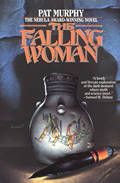
| Publisher: | Orb |
| Copyright: | November 1986 |
| Printing: | August 1993 |
| ISBN: | 0-312-85406-4 |
| Format: | Trade paperback |
| Pages: | 287 |
The Falling Woman opens with an excerpt the archeological notes of Elizabeth Butler on the Yucatán Peninsula, and then a short first-person introduction. Liz Butler is an aging archeologist and lecturer at Berkeley, difficult to get along with, difficult to get to know, experienced and abrupt. She, a colleague, and some students are working on a dig in Dzibilchaltún. They're studying ruins from just before the widespread abandonment of Mayan cities the 8th and 9th century AD for unknown reasons. She's not thinking about her daughter.
Diane Butler's father just died. She just broke up with her boyfriend. She thinks she might be going insane. And so, she's flying to Mexico to find her mother, who she hasn't seen in many years and who left her family when she was a child and came back for only very occasional visits. She knows little about archeology, has no idea how she's going to be received, and doesn't know what else to do.
Liz can see people in the past. She watches them go about their daily business centuries ago. Sometimes because of that she knows where to dig, where to look, where something must be hidden. She's come to terms with giving up some normal interactions with the world to be able to watch and understand the past. But on this dig, for the first time, she can interact with someone: a woman named Zuhuy-Kak, who claims to have told the Mayan people to leave the cities. She's clearly a person of great power, but what she tells Liz may not be designed to help.
There is a fantasy backdrop to this story, revolving around Zuhuy-Kak, her life and experiences, and her beliefs about the cycles of Mayan existence. It's the backdrop, though; the primary story is about Liz and Diane, their reunion, their past (shared and not), and their attempts to reconnect. A plot synopsis would make it sound like nothing much happens, but I found this book surprisingly engrossing. Murphy does a great job of close observation of human behavior and relationships and of keeping her characters complex and difficult. There are no magic reunions and no instant reconnections, just as in the archeology there are no magical discoveries or clear breakthroughs. In both, there is tangled drama and tragedy, stubborn people, and courage that doesn't necessarily lead to the correct action. There are also no revelations that suddenly explain everything about these people and their lives, just slowly growing understanding of why they live their lives the way that they do.
I think Liz is Murphy's best character in this book. She's come to terms with her life, including some horrors in her past, and has an appealing sense of honesty and confidence. She's refreshingly not stupid; she knows how others view her, has built a life for herself that works, has made difficult emotional tradeoffs and lives with the consequences, and doesn't make rash choices when something new enters it. The emotional portrayals here are adult, between people who think about their lives and their wants and who don't change course overnight. I got more emotional satisfaction out of Diane and Liz's difficult and stumbling relationship than out of any straightforward happy reunion because it felt much more real.
This is not the novel to read when in the mood for idea speculation, spectacular world-building, or dramatic action. It's an effective character study of alienation, of building one's own reality, and of the difficulty and rewards of finding a way to connect two of those realities while still honoring who the other person is. It's about adult relationships instead of ideals, and about discovering that the past isn't any less complicated than the present and the future. I liked the Mayan and archeological background and the feeling of watching real scientists at work, but beyond that I thoroughly enjoyed watching these people work their way through their emotions and lives.
Reviewed: 2007-02-08